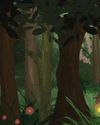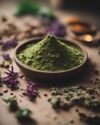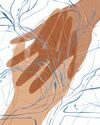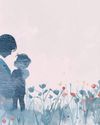
Q: You've spoken already about indigenizing our systems, but can you talk a bit about how to do that?
I believe that the Indigenous and Dominant worldview reflections can be taught along with the CAT-FAWN methodology. CAT stands for Concentration Activated Transformation. You can think of it as self-hypnosis or spontaneous hypnosis. FAWN is Fear, Authority, Words, and Nature. All we have to do is say, “Okay, we've got this challenge, whatever it is – making money, stopping pollution, or whatever it is. Let's use CATFAWN to get in touch with our world."
We start with CAT Concentration Activated Transformation. All right, what do we know? What are our assumptions, and are those assumptions true? Where do they come from? Most of our assumptions about life come from early childhood, but there are also things that have been taught by the authorities during times of fear. During times of stress, all creatures become hyper suggestible to the communication of a perceived a authority figure.
So, we look at meta-cognition. “What am I thinking about thinking? What is the source of this?” And, if necessary, we think about how that idea came to us and why we believe it.
We hold on to that CAT idea, and now we go to FAWN and we start with Fear. What are we afraid of? How does fear - in any of its forms, from apprehension to paranoia – influence what we're doing, what we're deciding?
In the Dominant Worldview, fear is to be avoided. We don't like it; we don't like the taste or smell of it. In the Indigenous Worldview, once the fight-or-flight mechanism of fear is over, it becomes an opportunity to practice a virtue - - patience, courage, generosity, fortitude, humility, honesty, persistence - the great universal virtues. Fear is an opportunity to practice those things.
This story is from the {{IssueName}} edition of {{MagazineName}}.
Start your 7-day Magzter GOLD free trial to access thousands of curated premium stories, and 9,000+ magazines and newspapers.
Already a subscriber ? Sign In
This story is from the {{IssueName}} edition of {{MagazineName}}.
Start your 7-day Magzter GOLD free trial to access thousands of curated premium stories, and 9,000+ magazines and newspapers.
Already a subscriber? Sign In

A Flower from THE HEAVENS
November 14 is Children's Day. This year, SARA BUBBER brings to you a world of forests, magical flowers, festivals, and some animals you may have never seen.

Meeting Phenomenal Women
The author, CHITRA BANERJEE DIVAKARUNI, is interviewed here by TARA KHANDELWAL and MICHELLE D'COSTA about her books on mythology, like The Palace of Illusions, which is a retelling of the Mahabharata from Draupadi's point of view, and The Forest of Enchantments, which is a retelling of the Ramayana, from the eyes of Sita. And there's The Last Queen, which is about Rani Jindan's life.

HERBAL TOOTH POWDERS: Rediscovering Ayurveda's Natural Secrets
SRAVAN BANDA presents a natural herbal tooth powder, offering a holistic approach to oral hygiene, harnessing the power of medicinal herbs.

The Dance of Light and Shadow Lessons from the Dolomites
ALAIN DESVIGNE explores the Dolomites, listed as a UNESCO World Heritage Site in 2009.

FINDING OUR WAY
A Polynesian Explorer's Journey of Discovery

The First Imprint: Understanding PTSD
CHRISTIANNA DEICHMANN is the Director of Education at the Association for Pre and Perinatal Psychology and Health (APPPAH), where she educates both professionals and parents on fostering the most nurturing environments for welcoming new life into the world.

The Tipping Point
In this final conversation of the series, J. FREDERICK ARMENT continues to talk with CHRISTINE JONES about promoting peace in the world.

UNLOCK YOUR POTENTIAL
Take The Brighter Minds Path To Cognitive Development

The Intrinsic Goodness of the Heart
DAAJI shares some thoughts on heartfelt acceptance and all it has to offer. He says, \"It is the heart's intrinsic goodness that allows us to accept everything as part of us.

How Does Fear Affect Our Roles as Mothers? - Neelam Shivhare explores some of the great ancient texts of India on motherhood, compares the behavior of Kaikayi and Yashoda
Neelam Shivhare explores some of the great ancient texts of India on motherhood, compares the behavior of Kaikayi and Yashoda, and realizes the importance of removing fear from our hearts in order to nurture our children.For young women like myself, who are future mothers, I trust we are on the path of becoming selfaware and brutally honest with ourselves. We are creative beings, never forgetting the gifts with which we have been bestowed— the love and tenderness, natural instincts, and intuition to feel the right path. It all lies in the mysterious meanderings of the heart. Are we really listening to our hearts, or confusing the bombarding information on social media with reality?